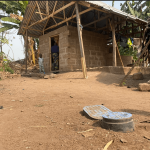Femi Idowu spent most of his youth into his 50s as a backup singer for Sunny Ade, a famous Nigerian singer who specialised in traditional African rhythm.
At age 51, he left the band because some members got involved in activities he considered fetish. Later, he tried to start his own band but was soon bogged down by severe financial difficulties that forced him to pick up strenuous jobs.
“All I could do was work in building sites,” Idowu said.
As he became older and could not continue working on sites, he depended on allowances his only child, who works at Abeokuta, Ogun State, sent him occasionally. But the allowances were never enough for Idowu, who did not only suffer hunger sometimes but loneliness too.
Found by a stranger
Idowu is now 75 and one of 9.4 million Nigerians (or 4.4% of the population) aged 60 and above. Most of them face challenges that threaten their dignity and well-being, including low earrings, delayed or suspended pensions, chronic sickness, family exclusion, societal stigmatisation, and near-zero support from the government.
These challenges reduce their survival chances, says a study published in the Elderly Health journal. The report said older person death constitutes 24.7% of all hospital deaths in Nigeria.
In 2018 when Idowu was 70, he received an invitation from a stranger to attend a socialisation programme organised by Age Nigeria Foundation, a local nonprofit defending the rights of older people and helping them manage challenges relating to ageing.
“She [the stranger] found me on the road and told me to come to the foundation. One day I decided to attend, and I enjoyed the place. I saw many people, discussed, and made many friends,” Idowu recounted.
The event took place at a socialisation centre in Lekki, one of several centres the nonprofit runs for older people to socialise and kill loneliness.
Later, Idowu became the leader of the centre’s music group and actively participated in outdoor campaigns for the rights of older persons.
“In September 2022, a UN independent expert on the rights of older people came to Nigeria. I led my colleagues to dialogue with her on the challenges of older persons, and they promised to look into it. This is one of the benefits the foundation offered me,” Idowu said.
The Genesis
The stranger who invited Idowu to the centre was 47-year-old Oluwayemisi Oluwole. Oluwole grew up watching her pastor parents carry out acts of kindness like giving out food and little sums of money to needy people, especially those they pastored at the Divine Tabernacle Mission Church in Apapa, Lagos.
Their generosity would later influence her to resolve to help others when she can.
In 2009, while Oluwole was with an aged family member who had gone to the general hospital in Idera community, Lagos, to receive free medical treatment under the “Prevention for blindness” medical outreach, an initiative of the state government, “I saw many older persons trying to get help. Some came with their children, but their children could not stay with them,” Oluwole said.
Some could not write their registration details due to old age, and some could hardly walk between sections, so she offered to help.
But “I could only help very few people,” she admitted. This experience inspired Oluwole to start the Age Nigeria Foundation because “I decided we could do more to help them.”
Age Nigeria Foundation started by organising community-based programmes where she educated older people on the challenges of ageing. With funds raised through social media campaigns, she could also provide them with free medical check-ups and drugs.
“We went with a team of medical staff to local communities like Lekki, Epe, and Ogba in Lagos. It was like a community service, where we spoke to their community leaders to offer this free service, and they permitted us,” she said.
Miracle meals
But later, Oluwole observed that the challenges of older persons were beyond health issues but had so much to do with loneliness, rights abuse and hunger.
So in 2020, the foundation refocused its mission to tackle these three problems.
For loneliness, it created a socialisation centre in Apapa, Lagos, where older persons came together to participate in physical exercises, share ideas and interact with themselves at least twice monthly.
Introducing these events soon sparked increased interest and increased participation from more older people from neighbouring Lagos communities. Soon, every time the foundation observed more people coming from a particular area to Apapa, it built a new centre in that location, including in Lekki, Epe, Odogbolu, and Ogere Lagos areas, plus one in neighbouring Ogun State.
To address rights abuse-related issues, the foundation takes up legal cases involving older people in its networks.
For example, when a family member extorts an older person or sells their properties without their permission, or an older person is maltreated and cheated by their employer at work, the foundation steps in.
“Some of these cases go as far as involving lawyers and going to court,” Oluwole said. “Those that we can settle amicably, we do, but if it needs us to consult a lawyer, we also do.”
She said the nonprofit has taken up at least 5000 cases and interacted with 450,000 older persons in 70 communities across Lagos, Ogun, Oyo, Osun, Kogi, Rivers, and Zamfara states.
“Protecting the rights of older persons and defending them against abuse, neglect, abandonment, and violence is a daily affair. For every five older persons we come across, we have directly intervened in protecting the rights of one older person,” said the founder.
For hunger, the foundation began a feeding project initially tagged “miracle meal”. Each older person in any community visited by the foundation received a pack of cooked food with prescribed drugs.
“We called it miracle meal because most cases with older persons could always be tied to feeding,” Oluwole explained.
Later, because the cooked food was nearly never enough, the foundation changed from distributing prepared meals to starting what it called the ‘Food Bank Project’, where it shared boxes containing raw foodstuff (rice, beans, plantain, and other cooking ingredients) to the elderly to cook in their homes.
“What kills old people most is loneliness, …[so we come] together to share issues. We also think about food and what to eat, [so] the foundation gives us food packages to support us,” said Idowu.
“The package contains a lot of foodstuffs that can last for two weeks, and they can get up to two packages in a month,” Oluwole clarified, adding that the foundation has shared about five million packs of raw and cooked food.
Besides raising funds through social media campaigns, its team appears on local radio talk shows to solicit financial support from the public. Yet, the funds are sometimes insufficient to meet its monthly programmes.
In 2022, the foundation shut down three of its social centres, which were rented spaces, due to slowed funds inflow. It now uses public gardens and homes of some members as alternatives.
Also, sometimes, family members of the elderly stand in the way of the foundation, accusing it of interfering in the affairs of their families and threatening to sue. This happens mostly when the foundation enforces an older person’s rights violated by a family member.
Though there are several groups in Nigeria providing support to older people, most of them focus only on the health challenges of older people.
Perhaps what sets Oluwole’s group apart is its careful attention to all the factors that make poor older people vulnerable: hunger, loneliness, rights abuse, and health.
This story was produced with the support of Nigeria Health Watch through the Solutions Journalism Network, a nonprofit organisation dedicated to rigorous and compelling reporting about responses to social problems.






